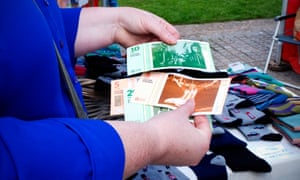Whilst researching into food banks and waste food
cafes, I came across a number of alternative currencies and credit schemes that
are being rolled out across the UK. I realised here that I could have made some
excellent synthesis between brief 01 and brief 02 in 505, but hindsight is a
wonderful thing.

One of the clearest demonstrations of a more
resilient democratic monetary system is a local currency that is endorsed by
local traders and, in the case of the Bristol pound, can be used on buses or to
pay council tax. Several exist in Britain, including the newly
launched Exeter pound and the Brixton Pound. Schemes such as local
time banks and online platform echo trade skills and resources rather
than money and can have wonderful impacts on local communities and
economies.
These alternative currencies are closely aligned to
the sharing economy. As writer John Thackara points out in his new book, How to
Thrive in the Next Economy, the sharing economy is based on social reciprocity
and networks, and does not need to “grow at all costs” in the same way as an
economy dependent on abundant cheap energy.
The alternative currencies have massive potential to expand as conceptual pieces. I think they are wonderful ideas and can definitely make a difference and alter our food waste tendencies and habits. They could be used by minorities in society who are unrepresented, underprivileged and perhaps are poor and food insecure. These alternative credits may be used in the future to 'pay' for food from food banks and waste food cafes and restaurants. For brief one, I could have designed a currency of this nature had I know for definite what I was going to be looking into for brief 02. This would have made for an excellent project and there would have been wonderful connections between the two briefs. Of course, there is nothing stopping me from designing an alternative currency as way of extending this brief past the internal deadlines of the course. I may well look into doing this.
No comments:
Post a Comment